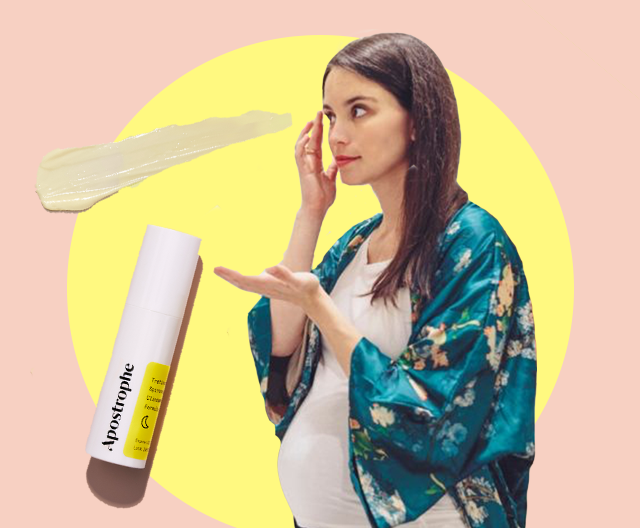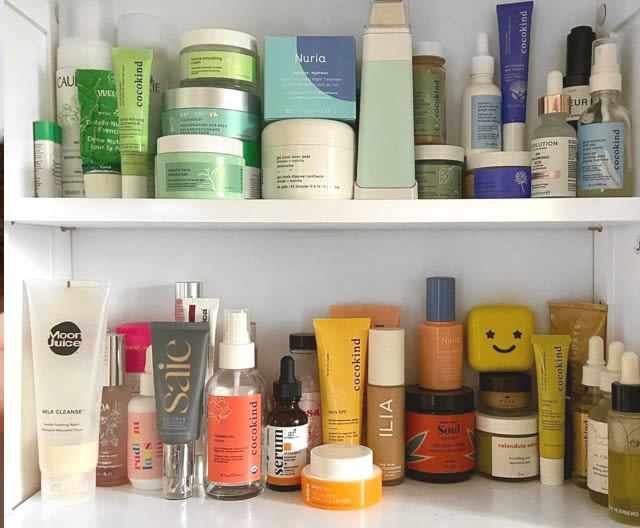Deep Dives
Pregnancy acne


SHARE
Deep Dives
Pregnancy acne
Medically reviewed by Mary Lucas, RN
Written by Apostrophe Team
Last updated 4/1/2024
When you’re pregnant, your body doesn’t feel like your own. Not only are you carrying another human, but parts of you seemingly unrelated to that task — like your complexion, hair, and feet — are changing too.
Many women experience skin changes while pregnant. For a lucky some, it’s a “glow.” But for others, it’s acne lesions — acne lesions everywhere.
Acne during pregnancy can be particularly troublesome. Not only is your body changing in different ways, but your face is now marked with a concern commonly associated with pubescent teens. Add to that the difficulty in finding an appropriate treatment method during pregnancy, and this new symptom can make you even more stressed in an already stressful period.
But, don’t despair. There are ways to treat acne-prone skin in pregnant women and this article will guide you in finding the right ones for you.
What Causes Acne?
Acne is generally caused by a combination of four factors: oil (sebum) production, dead skin cells, inflammation, and the presence of bacteria.
Generally, oil produced in the sebaceous glands under the skin travels up your hair follicles and moisturizes your complexion.
However, pimple results when dead skin cells block your pores (the exit point for the sebum). Add bacteria and these pimples can turn into inflammatory lesions that ultimately lead to scarring.
Multiply those lesions, and you have acne.
Several things can trigger this process or put you more at risk for acne. Those things include: hormonal changes during puberty, taking (or stopping) birth control pills, some medications, excess oil on the skin — whether through cosmetics or even cooking oil, smoking, stress, and hormonal changes during menstruation and pregnancy.
According to research, as many as 85 percent of women experience worsening acne in the days leading up to their period. Likewise, researchers observed that many women were treated for acne when they were entering menopause, during the perimenopause period.
The Pregnancy-Acne Connection
Acne is one of the most common reasons pregnant women go to the dermatologist.
It’s believed pregnancy can trigger acne because of the increase in androgenic — what is typically known as “male” sex — hormones. These androgens are the very things to blame for increased acne occurrence during puberty, though changes to your immune system can also be to blame.
Most pregnant women who experience gestational acne have struggled with acne in the past, though that isn’t always the case.
Acne during pregnancy is sometimes inflammatory acne. Inflammatory pimples are more likely to be red and painful, and result in scarring.
Pustules (characterized by pus at the top and a red base), nodules (hard, large, and painful pimples), and cysts (pus-filled, deep pimples) are all examples of inflammatory acne.
How Common Is It?
Adult female acne is fairly common. We know women are affected by acne more often than men, and that acne is typically more severe.
Because many women report worsening acne around their menstrual cycle, the hormonal fluctuations women experience could be to blame for their increased risk of acne.
While it isn’t clear how many pregnant women are affected by acne, one recent survey found that 40 percent of pregnant women who visited a dermatologist’s office did so because of acne.
Acne Treatment Considerations During Pregnancy
The main issue when dealing with acne during pregnancy is treating the acne without putting your or your baby’s health at risk.
While there are numerous treatment options for adult female acne, not all of them are safe for use when pregnant.
The best way to know for certain whether a medication is safe for you to use while pregnant is to consult with a healthcare professional or dermatologist.
Some drugs are widely known to be unsafe for pregnant women and their unborn fetuses, while others have not been researched enough in pregnant women to know for certain. A healthcare professional can best help you weigh the potential risks versus rewards of taking a particular medication. However, we can provide a brief overview.
Not safe during pregnancy
Some drugs are known to be unsafe to take during pregnancy. These include drugs that have been well-researched and found to cause fetal abnormalities. They simply shouldn’t be taken, and include:
Tazarotene. Tazarotene is a topical retinoid, or a medication you apply directly to the skin that is derived from vitamin A.
It is sold under the brand names Avage®, Fabior®, and Tazorac®, and is classified as a “category X” drug in regards to pregnancy safety, and even women who may become pregnant should be warned of the risks of birth defects.
Isotretinoin. Like tazarotene, isotretinoin is a topical retinoid. It is sold under the brand names Absorica®, Amnesteem®, Claravis®, Myorisan® and Zenatane®. Very little of the medication is absorbed into the body, but it is known to increase the risks of birth defects.
Spironolactone. Spironolactone, sold under the brand names Aldactone® and Carospir®, is an anti-androgen drug that works by suppressing the hormones that can cause acne. Some research indicates these same actions can cause feminization in male fetuses.
May be unsafe or needs more research
Scientific researchers don’t experiment on pregnant women, so sometimes the only evidence of a drug’s safety in women is based on how a drug reacts in animals, known reactions of related drugs, or incidences where women report taking medications and then having adverse events. In general, the following medications are not recommended for use in pregnant women, though the true risks may be unknown. In some cases, healthcare professionals may prescribe some of these drugs for short-term use.
Adapalene (Differin®)
Tretinoin (Retin-A®)
Salicylic acid
Dapsone (Aczone®)
Many oral antibiotics (tetracycline, minocycline, doxycycline, trimethoprim, amoxicillin, azithromycin, and erythromycin, for example)
Safe to use in pregnancy
Some acne treatments are known to be safe and effective during pregnancy. However, your doctor may recommend only short-term usage, to lessen any potential risks.
Benzoyl peroxide
Azelaic acid
Cefadroxil (oral antibiotic)
Zinc
A doctor will be the best guide in determining a course of action to relieve your acne during pregnancy. Given your medical history and the latest research at their disposal, they’ll be able to help make safe recommendations for you and your unborn child.
References:
https://www.hopkinsmedicine.org/health/conditions-and-diseases/acne
https://www.aad.org/public/diseases/acne/derm-treat/pregnancy
Like what you just read? Sign up for our email list to get the scoop on skincare science delivered straight to your inbox.

Education
What is milia?
What is milia? Today, we’re jumping into one type of bump that you may have heard about most commonly in infants — milia.
Read More
Education
Best moisturizer for acne-prone skin
If you have combination acne-prone skin, figuring out which moisturizer is best for your skin might be tough. In this guide, we break down the best moisturizer for combination, acne-prone skin.
Read More
Education
How to build a face care routine
As you get into skincare, it might seem overwhelming, especially trying to figure out the order you're supposed to apply products in. Below, we detail how to build a face care routine for your skin!
Read More
